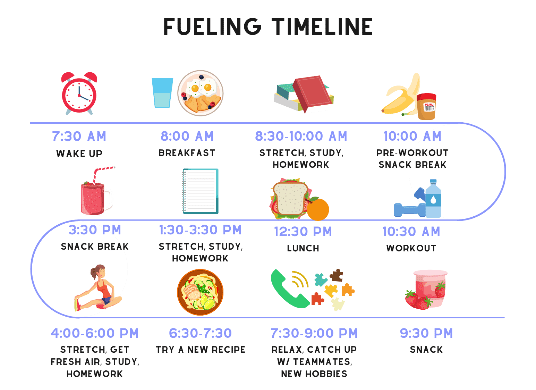By: Lilli Rozanski, MS, RDN, LDN, Sports and Fitness Dietitian, Thibodaux
Regional Health System
Competitions have been cancelled or postponed indefinitely leaving athletes
to wonder what is next. Everything is changing by the day resulting in
stress and a range of uncomfortable emotions. Athletes may be feeling
overwhelmed, anxious, and fearful, but they are not alone. As the coronavirus
continues to affect everyone’s daily routine, it is now more important
than ever to stay positive and mentally fit. Thibodaux Regional Health
System can help by offering some positive and actionable tools that athletes
can benefit from right now.
Create a Routine
Athletes are used to demanding schedules, so developing a home routine
has its benefits. Routines provide consistency and structure which can
help provide normalcy. Take time to establish a routine that helps support
overall health and well-being. Set an alarm, get up, get dressed in clean
clothes, and start the day with breakfast! Lounging around in your pajamas
may seem appealing, but it can actually make a person less productive
and promote depression. Showering and wearing clean clothes every day
not only promotes good hygiene and mood, but actually can help prevent
the spread of COVID-19. “Research shows that athletes should get
anywhere between 7 to 9 hours of sleep per night,” said Thibodaux
Regional Sports Medicine Center athletic trainer Tyler Trahan. Trahan,
who serves as head athletic trainer for Nicholls Athletics, also recommends
limiting screen time at least 1 hour prior to going to bed.
Create a Fueling Timeline
An integral part of creating a routine also includes meals and snacks!
Eating regularly throughout the day will help keep energy levels up, help
you focus on classwork, help maintain muscle mass, and keep metabolism
functioning optimally. To keep energy up for classes and workouts, eat
something every 3-4 hours. Incorporate whole grains, fruits and veggies
for long lasting energy throughout the day and don’t forget to hydrate!
See below for an example fueling timeline.
Mindful Eating During Quarantine
Are you steadily working towards gaining the quarantine 15? It is normal
to stress eat when things feel out of our control. It is also normal to
eat when boredom strikes, both of which may be happening a lot lately.
The Hunger-Fullness Scale describes varying degrees of hunger and fullness
to help identify how hungry and full you truly are, and to help you know
when to start or stop eating. Using this scale allows you to tap into
the body’s built-in appetite regulating system to help shift towards
eating more mindfully. Try to stay between a 3-7 on the Hunger and Fullness
Scale, which for most people means eating every 3-4 hours.

Exercise
Just because an athlete cannot go to the gym or attend a favorite class
right now, does not mean they have to miss out on exercise. This time
should be used to discover online workout classes that can be done at
home, in the backyard, or at the park while still practicing social distancing.
Trahan recommends incorporating high intensity interval training (HIIT)
into the training plan. HIIT exercise is repeated bouts of high intensity
effort followed by varied recovery times. “HIIT training helps with
fat loss, it can save time, burn more calories, and increase your metabolism,”
said Trahan. “You also continue to burn calories post-exercise due
to the EPOC (excess post-exercise oxygen consumption) effect. HIIT training
stimulates a higher EPOC because you consume more oxygen during this type
of session. Your body then has to work harder post workout to regain ‘homeostasis’
which means you will continue to burn calories even once you finish.”
His examples of HIIT include short sprints (30 sec 80/90% max effort/3
min rest) or cycling (3-5 min on 80/90% max effort /3-5 min rest-40/50%
max effort) until failure.
Mental Health
In the midst of everything going on in the world, try to practice social
media and news distancing or at least implement some boundaries on time
spent consuming content right now. It’s important to stay informed
with evidence-based and reliable sources; otherwise, reports may be inaccurate
and not positively affect your wellbeing.
- Keep an eye on the future. Coach yourself to maintain supportive thoughts
and feelings. Eventually, events and competitions will return, so make
sure to stay prepared and ready for that moment. Part of this can be done
by setting new, concrete goals which fit into your new routine. Establish
realistic and achievable goals, which you have discussed with your coach
and plan to achieve these through daily activities.
- Social distancing should not mean social disconnection. Use apps and other
technology to stay connected and be mindful that you might want to check
in with people who are important to you on a more frequent basis than
usual. Share your feelings with a friend or family member. Lean on your
support systems and maintain relationships. Schedule joint home training
with a teammate and work out together remotely via FaceTime, Zoom or WhatsApp.
And take this opportunity to re-connect with family and friends!
- Try to remember patience. No problem will stay forever. A problem today,
could be resolved tomorrow. This pandemic will resolve too! During this
time, focus on seeing the positives of everything, and try things that
you don’t have time to do in normal life when you have school, work
or training.
As a reminder, let’s all do our part to support each other during
this time and focus on the gratitude, the positive, to reflect, to be
mindful, and to be resilient. Thibodaux Regional Health System is here
for you each step of the way.